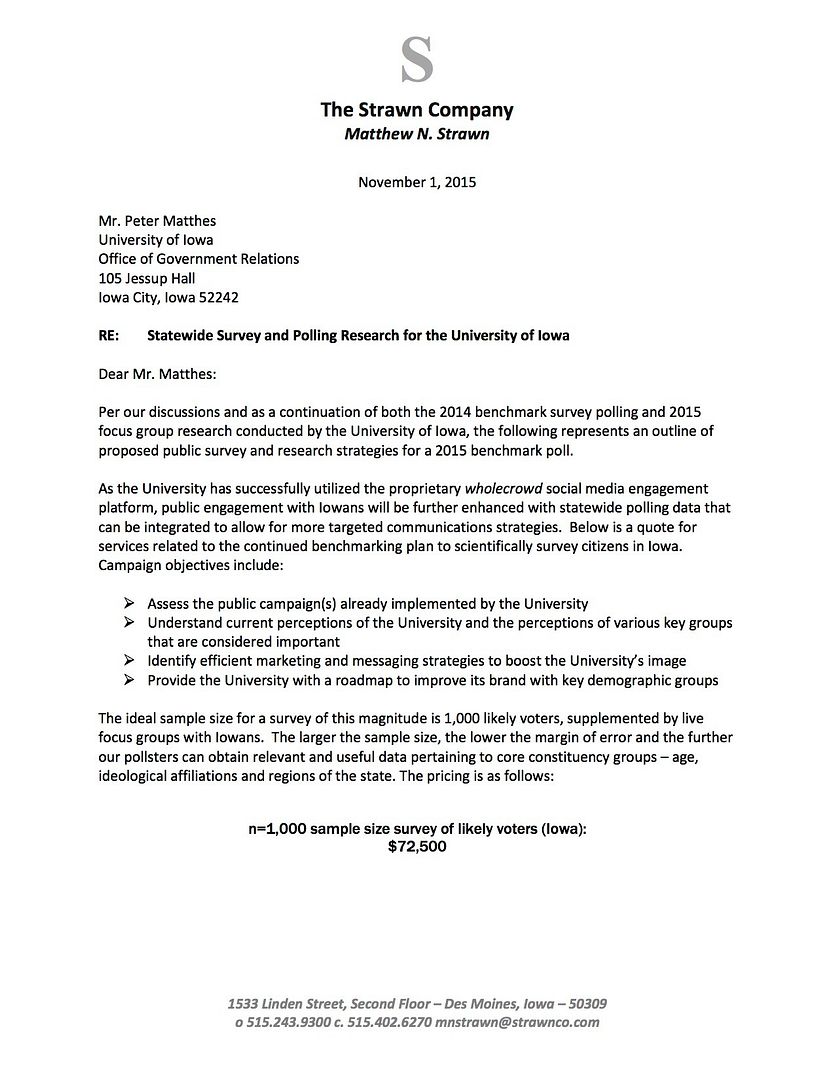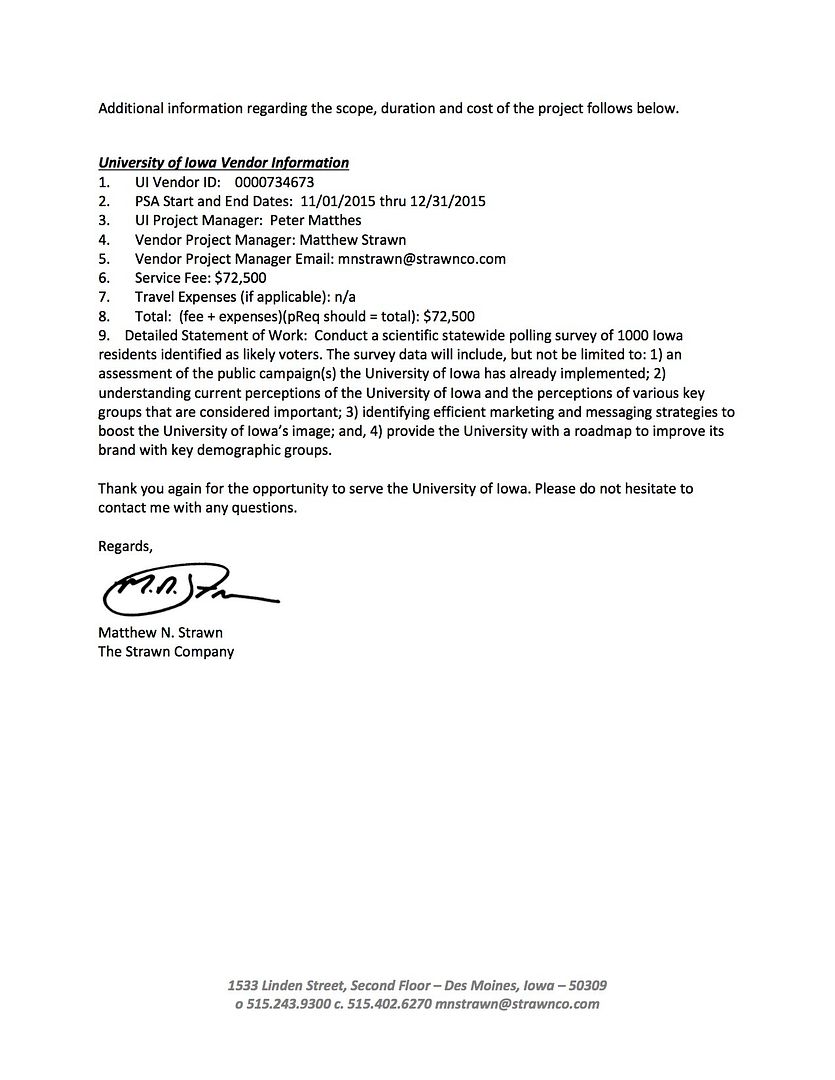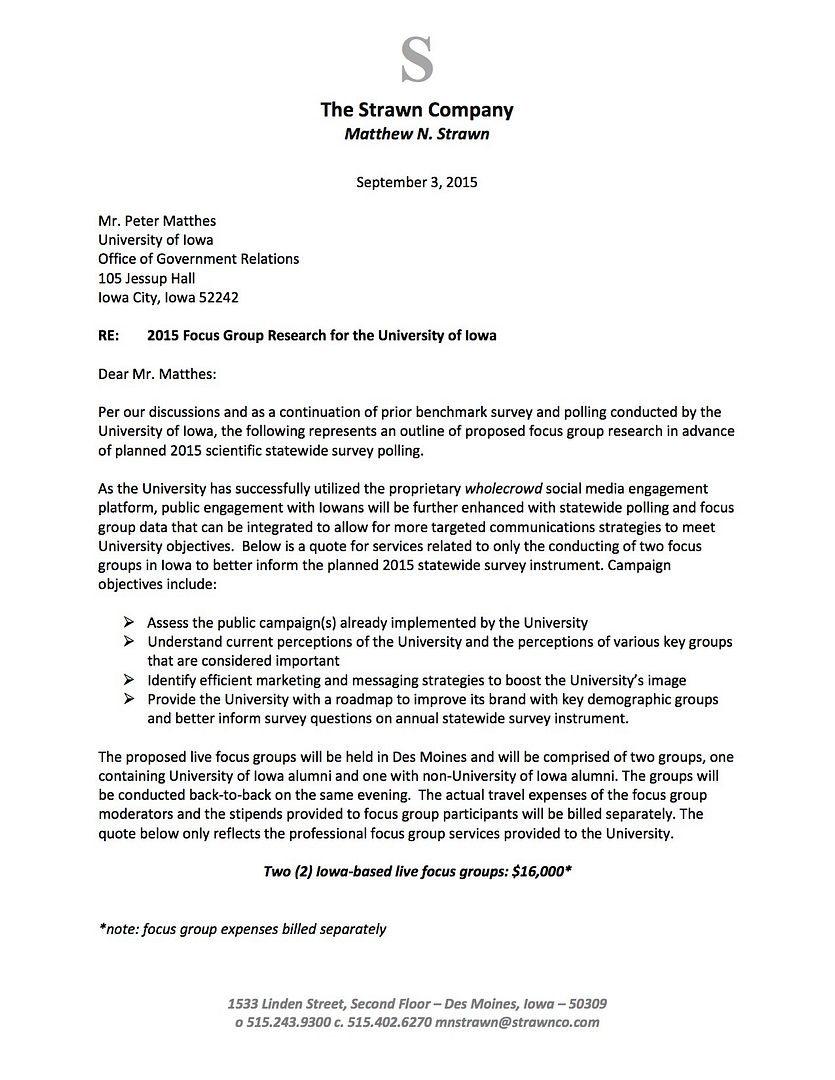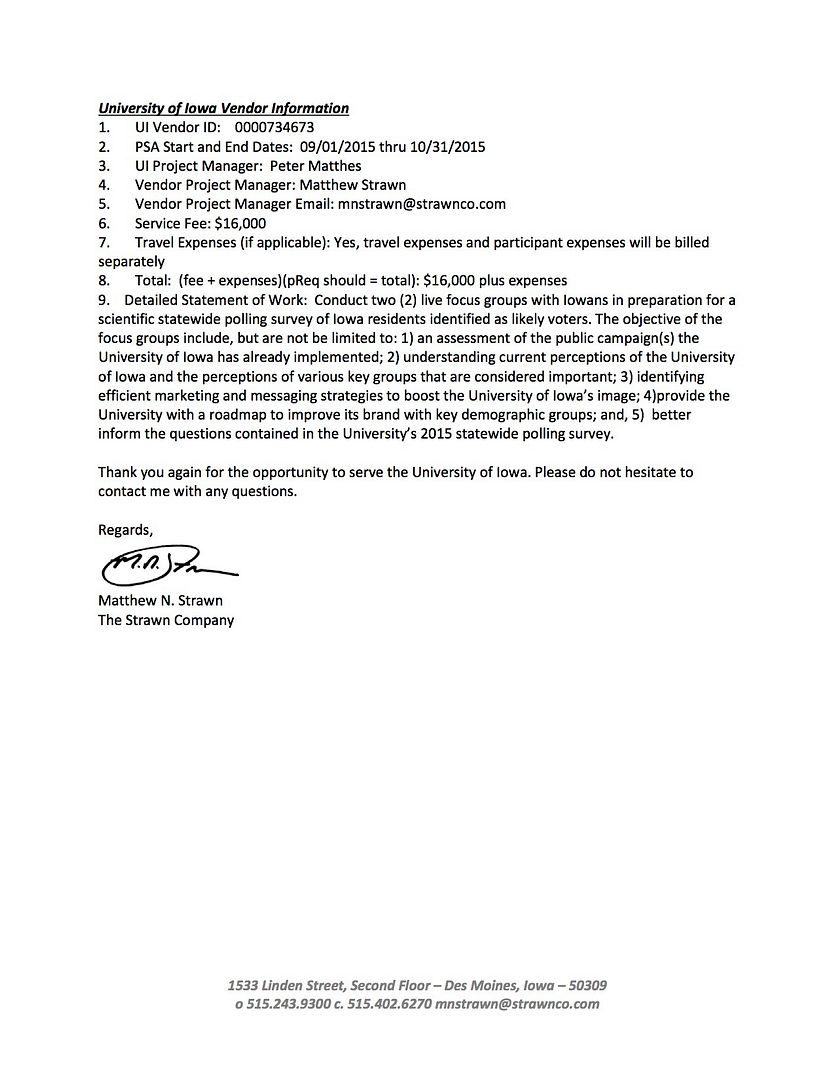As if we haven’t heard enough lately about backroom dealings involving the University of Iowa, Ryan Foley reported yesterday for the Associated Press,
The University of Iowa has quietly awarded several no-bid contracts totaling $321,900 to a prominent GOP consultant for polling and social media services often delivered through subcontractors, a review by The Associated Press discovered.
Critics say the contracts with former Iowa Republican Party chairman Matt Strawn’s namesake company — uncovered through a public records request — look like a sweetheart deal among Republican insiders and a potential waste of money.
That’s putting it mildly.
The contracts should have been put out for competitive bidding.
Competitive bidding rules exist to help institutions get the best bang for their buck when buying goods and services. They are supposed to prevent well-placed staff from steering business to contacts who may not be most qualified to do the work.
Foley discovered that Strawn’s first contract with the University of Iowa was for “online and grassroots advocacy” in the amount of $24,900, barely “below the $25,000 threshold that triggers a requirement to request quotes from vendors.” By the way, that’s not just a university rule.
The state Code of Iowa, federal law, and the Board of Regents, State of Iowa, mandate competitive bidding for the purchase of all University goods and services greater than $25,000 in value.
A no-bid contract for $24,900 looks like a brazen attempt to skirt the legal requirement. The university might have found other vendors willing to improve its social media presence for less. Strawn’s company didn’t even perform most of those services. Rather, he subcontracted Wholecrowd to do much of the work. (More on Wholecrowd below.)
More damning, when the University of Iowa commissioned a statewide poll in the fall of 2013, Foley reported, “it obtained a waiver to give the work to Strawn’s company, saying the polling would complement Wholecrowd’s social media engagement and create ‘a seamless communication system that no other vendor can replicate.'” The University of Iowa’s Operations Manual (11.9) is clear about when competitive bidding rules may be waived. Here’s the relevant language:
There is only one person or firm that can provide the requirement. No other known person or firm is available with an equivalent service or supply.
A former university official with “25 years’ experience in higher education marketing” told Foley that lots of companies could have conducted a statewide survey on behalf of the university. In contrast, The Strawn Company was not able to provide that service, because it is not a polling firm. Documents Foley reviewed indicate that the university “directed Strawn to find a pollster with higher education experience.” Where is the “seamless communication system that no other vendor can replicate”?
Side note: I was surprised to see the university contracted with The Strawn Company rather than with Next Generation Public Affairs, the government relations firm Strawn co-founded in June 2013. Strawn’s Linked In profile describes Next Generation Public Affairs as “a Chicago-based, full-service public affairs firm providing clients with comprehensive and technologically sophisticated government affairs, issue advocacy and media relations strategies.” The same page states, “The Strawn Company holds and manages interests in the agriculture, real estate, sports and entertainment, and technology sectors. It also includes Strawn Communications, a strategic communications consulting firm.” That description doesn’t scream “great fit” to handle a statewide poll for a major university–certainly not the kind of exceptional fit that might justify waiving competitive bidding rules.
Worse yet,
The university appears to have overpaid for Strawn’s services.
The University of Iowa’s latest no-bid contracts with Strawn were for $72,500 to conduct a statewide survey in November and for $16,000 plus expenses to conduct two focus groups in Des Moines. I enclose at the end of this post memos from Strawn to Peter Matthes, the university’s vice president for external relations and the project manager for work involving The Strawn Company. “Per our discussions,” Strawn outlined the scope, duration, and costs of those projects. Those communications do not allude to The Strawn Company subcontracting out the work. Reading this correspondence alone, one would assume Strawn’s firm was planning to conduct the focus groups and statewide poll, then analyze the results to “provide the University with a roadmap to improve its brand with key demographic groups” (Strawn’s words).
Julie Stauch, a veteran of numerous Democratic campaigns who has experience with statewide polling, told Foley “she believed the university was overpaying by passing contracts through The Strawn Co., an arrangement that can increase costs by 15 percent.” I have not seen documents indicating how much of the university’s money went to the subcontractors who did the work and how much went toward Strawn’s bottom line. As far as I know, his markup could be higher or lower than 15 percent.
Former Iowa House Democratic staffer Mark Langgin managed the 2010 campaign for a state constitutional amendment to create a natural resources trust fund. Now an owner and partner at the design and digital firm GPS Impact, Langgin told me yesterday,
Statewide polling costs are a function of 1) length/complexity of the survey instrument, and 2) size of the sample, 3) Live calls vs. robo survey (IVR), 4) are cell phones included. Typical statewide polls using live callers, talking to cell phones with sample sizes in the N = 600 to N = 1000 range are going to cost anywhere between $25,000 – $50,000 depending on survey complexity, quality of the firm, whether they call cell phones, etc. […]
[D]oing this as a “subcontractor” definitely does add to the costs and many “General Consultants” would typically mark-up subcontracted services some percentage. In an ideal world the client (University of Iowa) would have transparency into the scope of service Strawn is providing directly vs. the subcontractor and what the mark-up would be.
Stauch told me by phone that she was involved with a 2010 statewide poll that asked 30 questions of 850 respondents for a price of $35,000. The University of Iowa’s poll reached a larger respondent pool and had a longer questionnaire–though I haven’t seen the script, for reasons explained below.
Speaking to Bleeding Heartland off the record yesterday, another source with access to statewide polling during the 2014 election campaign suggested that $72,500 was too much for the university to pay for a survey of 1,000 Iowa respondents, even assuming a long questionnaire. Both that source and Langgin thought $8,000 per focus group for two focus groups in Des Moines sounded like a reasonable fee, however.
I have no doubt that if the university had used a competitive bidding process to find a pollster, several firms would have offered to conduct this survey for less than what the university paid The Strawn Company.
Another point lends a stronger aura of corruption to this series of no-bid contracts.
At least one key university official was kept outside the loop.
This passage may contain the biggest red flag in Foley’s story:
Joseph Brennan, the university’s recently departed vice president of strategic communication, said he never heard Strawn’s name during his two-year tenure. He thought the contracts were directly through polling firm Wilson Perkins Allen and digital media advocacy startup Wholecrowd. Brennan said he worked with those companies and they provided valuable services, but was stunned to learn of Strawn’s behind-the-scenes role from the AP.
“It doesn’t look good. It looks like enriching your buddies,” Brennan said. “I’m a big end-user of this stuff. And I never had one meeting with him?”
Brennan’s comments underscore that The Strawn Company did not contribute anything meaningful to the work product. If Strawn had played any significant role in improving the U of I’s social media presence, or in collecting or analyzing data from opinion polls and focus groups, he would have been in contact with Brennan–or at the very least, his name would have been on documents reviewed by Brennan.
The university official who arranged for the no-bid contracts knew Strawn through partisan Republican work.
Speaking to Foley, Stauch asked, “Is this ineptitude on the part of university personnel or is it conscious cronyism?”
Those two interpretations aren’t mutually exclusive, but if forced to choose just one, I’ll go with cronyism.
I recognized Matthes’ name, because in his capacity as interim chief of staff for the U of I, he served on the 21-member committee appointed this year to search for a new university president. He also attended a secret meeting in Cedar Rapids in early June, where Iowa Board of Regents President Bruce Rastetter and search committee president Jean Robillard first met Bruce Harreld in person.
I did not realize Matthes was also a former Iowa Senate Republican Caucus staff director, a position he held during the time Strawn was state party chair. (I should have remembered, because a civil rights complaint and a later civil suit filed by former Iowa Senate GOP communications director Kirsten Anderson refer to Matthes.)
Political networking may explain why Matthes was so keen to offer Strawn the initial contract for $24,900, and why he opted against an open bidding process for the university’s more expensive contracts. But they aren’t the only reason Foley mentioned that critics say the no-bid contracts “look like a sweetheart deal among Republican insiders.”
The Strawn Company subcontracted much of the social media work for the U of I to Wholecrowd. Foley notes that Wholecrowd’s founder Jim Anderson was the Iowa GOP’s executive director during the 2010 election cycle, when Strawn was state party chair.
Wilson Perkins Allen, which conducted the statewide polls and focus groups for the university, is one of the country’s top Republican polling firms. It has done similar work for other universities, so clearly was qualified to do the research. But since the $72,500 cost for this year’s opinion poll included a cut for The Strawn Company, it’s likely the university could have contracted directly with Wilson Perkins Allen to provide the same services for less–if multiple bids had been sought.
The “nothing to see here” crowd may claim there was no harm in Matthes wanting the university to hire someone he knew to be highly competent, and no reason for U of I alumnus Strawn not to seize the “opportunity to serve the university,” as he put it in his memos to Matthes. Let’s assume for the sake of argument that good intentions, not greed, lay behind these no-bid contracts. Matthes still had no grounds to circumvent competitive bidding rules. If Strawn was highly motivated to work for his alma mater, all he had to do was submit the best proposal for the projects–admittedly a tall order for a company with no track record in conducting opinion polls or focus groups.
Something else about the university’s lack of transparency has been bothering me.
The university is withholding key documents related to services Strawn provided.
After learning an acquaintance had been a respondent for a lengthy poll testing opinions and messages about the U of I, I wanted to publish more details about the poll at this blog. University spokesperson Jeneane Beck told me the university’s annual marketing survey is conducted in November in odd-numbered years and in December in election years, so I submitted a records request seeking information such as: who conducted the poll; how much the poll cost; the source of university funds spent on the survey; details on the poll’s methodology (landlines only or also cellphones; was the firm sampling all Iowans or a subset of Iowans with certain attributes); a copy of the questionnaire; the summary polling memo, full results and cross tabs; and questionnaires and results from similar polls taken in recent years. University Transparency Officer Ann Goff responded via e-mail,
Attached are the contracts related to the University of Iowa’s annual marketing review which shows the survey cost. This wasn’t funded through the General Fund. Gift dollars were used to fund this survey.
I checked with our general counsel’s office and was advised that the script and findings of the survey will not be provided as these are protected under Chapter 22.7(6) of the Iowa Code.
The attached documents were the memos from Strawn enclosed below, along with some e-mail correspondence about further expenses for Strawn’s company.
Iowa Code 22.7(6) allows “Reports to governmental agencies” to remain confidential if their release “would give advantage to competitors and serve no public purpose.” Even without knowing about the no-bid contracts Matthes offered to Strawn, I strongly disagreed with the contention that revealing details about the survey would “serve no public purpose.” The University of Iowa is a public entity, and this poll had many potentially newsworthy angles: how Iowans perceive the university and value its education; how those views have changed over time; how the university is marketing itself to the public; which new approaches (such as distance learning) are under serious consideration; how the university has altered the questions asked in its annual poll; and Iowans’ perceptions of university president Harreld, who had just started his new job when this year’s survey was in the field.
Now that I know Strawn’s company was awarded no-bid contracts for the last three years to conduct this survey, I am even more motivated to read the scripts used by callers and see the tabulated results. Were any policy questions with possible applications for Republican candidates smuggled into the survey? Do the results show statistically significant differences between Iowa Democrats and Republicans in how they view the university?
Any relevant comments are welcome in this thread.
DECEMBER 16 UPDATE: The Des Moines Register’s editorial board denounced the no-bid contracts and withholding documents related to the poll.
But what’s really alarming about all this is the university’s refusal to make public the poll’s findings. The school justifies the secrecy by pointing to an exemption in the state’s Open Records Law for documents that if disclosed would give an advantage to Strawn’s competitors and also would “serve no public purpose.”
That argument doesn’t hold water. The school claimed that the polling contracts weren’t put up for bids because there was “no other vendor” who could possibly do this sort of work. So how can it now claim that Strawn and his pals will be put at a competitive disadvantage if the results of their work are made public?
“It’s their copyrighted report,” says UI General Counsel Carroll Reasoner. “The information in it could be used by competitors of them, using their protocol for polling — and also by competitors of the university as we seek out students to come to the university and figure out how we want to message ourselves to students and parents.”
At the risk of stating the obvious, if the polling served a legitimate public purpose, then the results of that polling — which would simply reveal the school’s perceived strengths and weaknesses — must also be in the public interest. The argument for keeping this information confidential is simply a legal fiction that has been sloppily constructed on other, conflicting fabrications of the school’s own creation.






2 Comments
keep looking
Someone should look into the backgrounds and potential conflicts of interest of both Matthes and his predecessor, Mark Braun, who now works for the Regents.
turtlemilk Fri 11 Dec 10:14 AM
Keep digging!
Thanks for what you have told us so far. This UI grad is anxious to know the whole story.
iowavoter Sat 12 Dec 7:07 PM